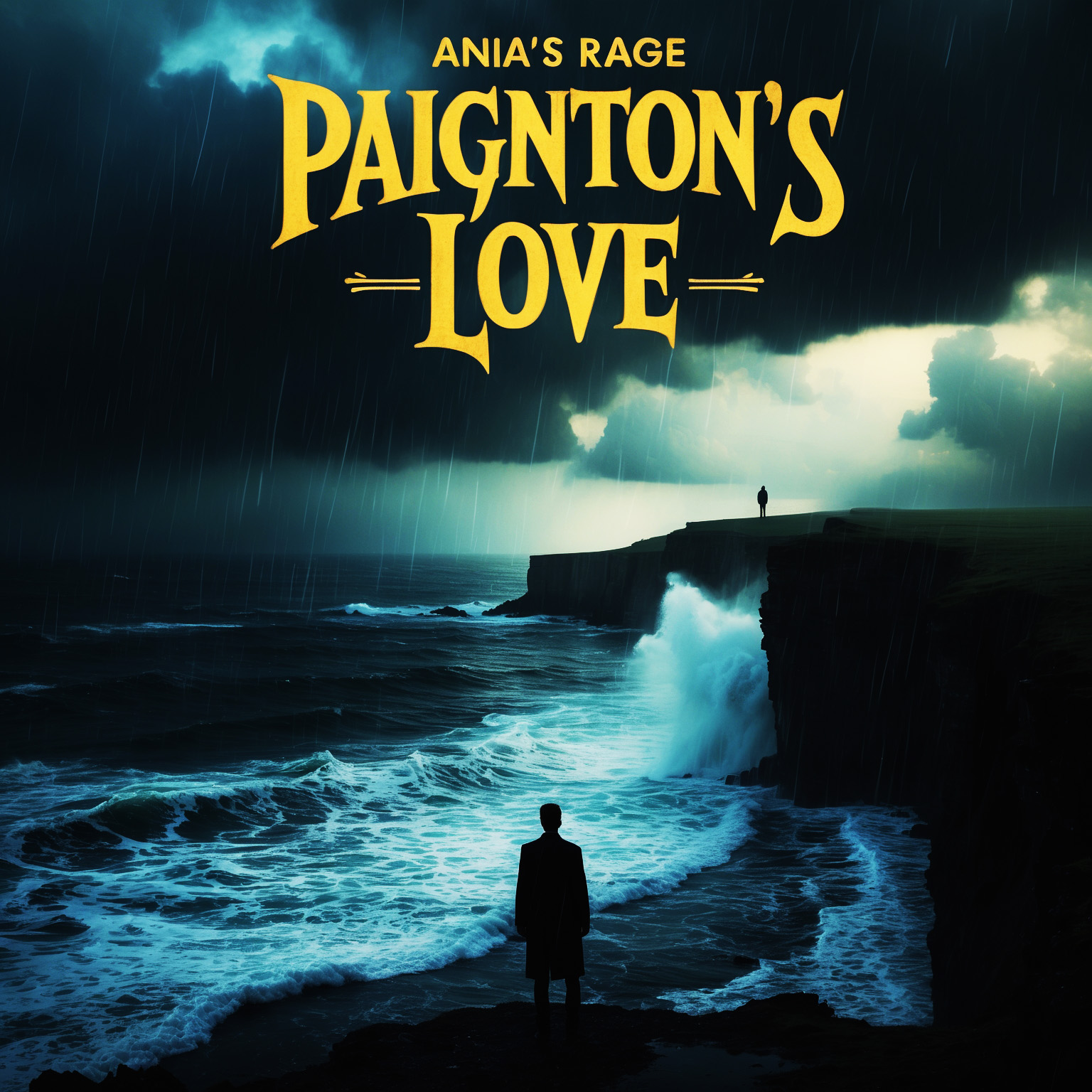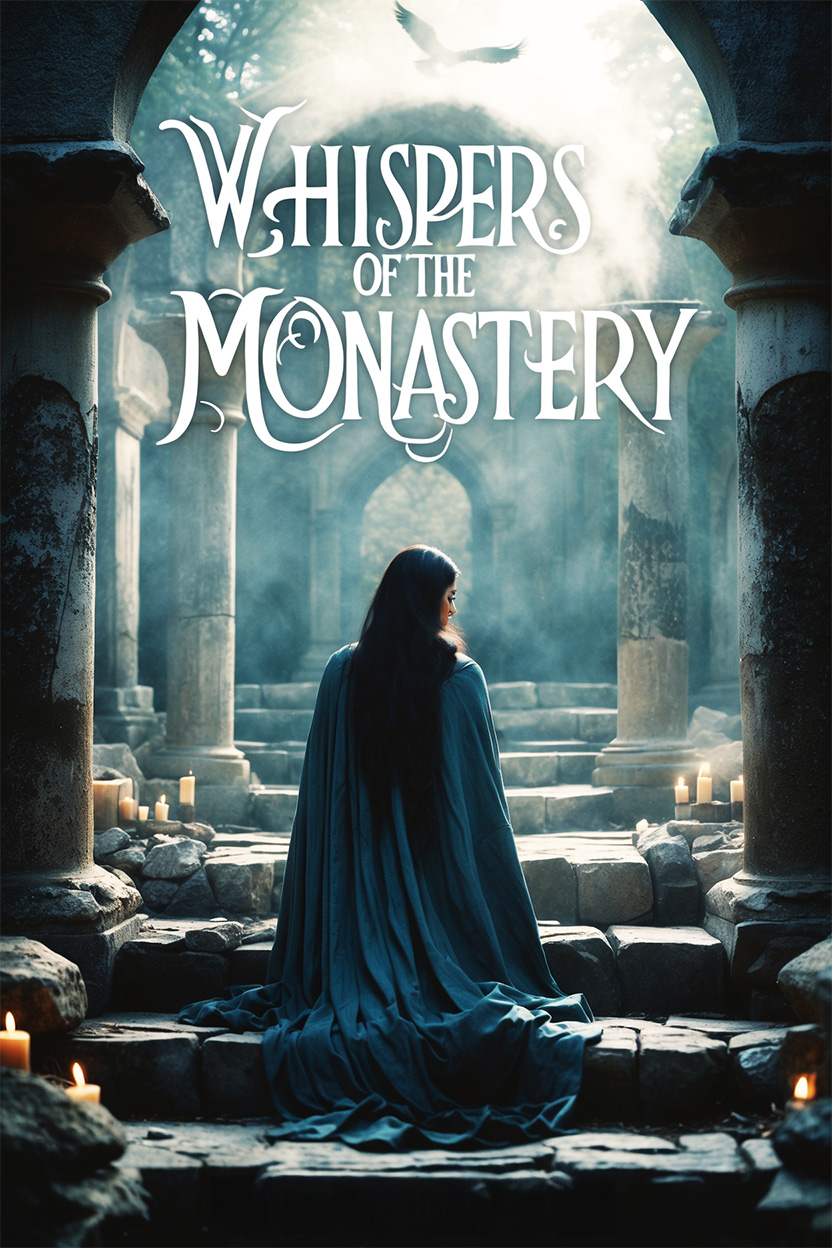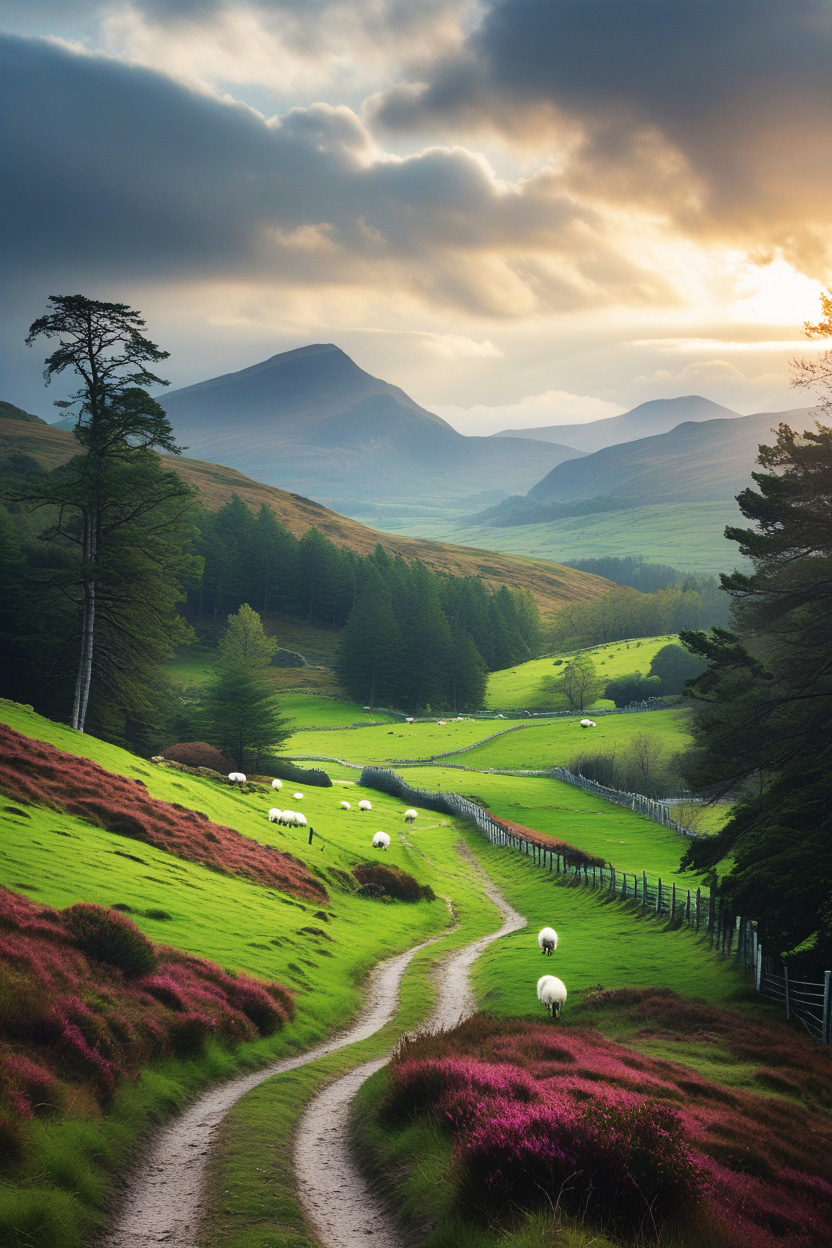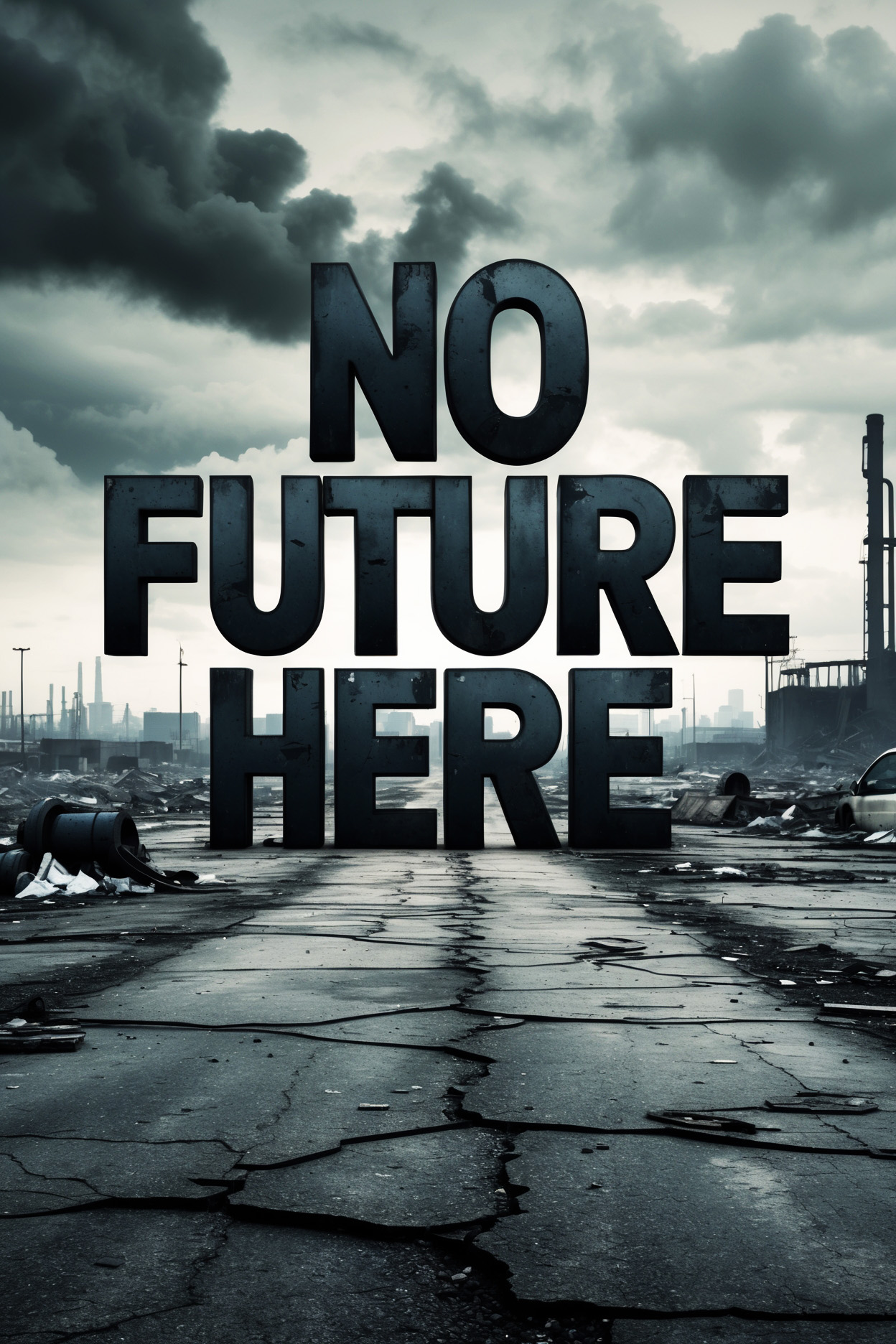Paignton's Love - Music
Composed 2025
Ania and Quinn had always found solace in the wild places, where the world couldn't touch them. Their love was a quiet flame—fierce in its intimacy, but never one for grand gestures. Ania, with her wild auburn curls and freckles like scattered stars across her nose, was the dreamer; Quinn, broad-shouldered and steady as an old oak, was the anchor. They'd met two years ago in a rainy café in the town, bonding over shared sketches of forgotten places. Now, on a crisp autumn afternoon, they set out for the old Monastery, an abandoned relic hidden deep in the Berry Forest. It was Ania's idea—a spot she'd read about in a dusty folklore book, promising crumbling stone arches and ivy-choked cloisters perfect for a stolen afternoon of whispers and warmth.
The forest path was a ribbon of fallen leaves, crunching under their boots like brittle secrets. Sunlight filtered through the canopy in golden shafts, dappling Quinn's flannel shirt and catching the silver thread in Ania's scarf. They walked hand in hand, fingers laced loosely, the kind of touch that spoke volumes without words. "Just you and me," Quinn murmured, squeezing her hand as they passed a gnarled birch that leaned like a sentinel. "No emails, no deadlines. Just this."
Ania laughed, a sound like wind chimes in the breeze. "And maybe a kiss under those ancient arches. I've packed the blanket and the thermos—hot cider, your favourite." She leaned her head on his shoulder for a moment, inhaling the earthy scent of him mixed with pine. The air was alive with the rustle of squirrels and the distant call of a raven, but it felt like their own private symphony. They'd left the trailhead at noon, figuring the three-mile hike would bring them to the monastery by mid-afternoon. Plenty of time for cuddles before the sun dipped low and painted the ruins in twilight hues.
As they delved deeper, the forest thickened. The path narrowed, roots snaking across like veins, and the trees grew taller, their branches knitting into a verdant ceiling that dimmed the light to a soft emerald glow. Quinn pulled out his compass, a battered heirloom from his grandfather, just to be sure. "We're good," he said, though Ania noticed a faint crease between his brows. She teased him about it, calling him her "boy scout," and he pulled her close for a quick kiss—salty from the trail mix they'd shared, sweet with promise.
But the forest had its own ideas. An hour in, the air turned cooler, carrying a whisper that wasn't quite wind. Leaves stirred without breeze, and the birds fell silent. Ania shivered, blaming it on the encroaching shade, but Quinn's grip tightened. "Hear that?" he asked, pausing. It was faint—a murmur, like voices echoing from far away, layered and indistinct. Laughter? Chanting? They strained to listen, but it faded as quickly as it came. "Probably just the stream we passed earlier," Quinn said, forcing a grin. "Echoes playing tricks."
Ania nodded, though a prickle danced up her spine. She slipped her arm around his waist, drawing comfort from his solidity. They pressed on, the path now overgrown with ferns that brushed their legs like curious fingers. The map on her phone had lost signal miles back, but she trusted the folklore book's description: follow the old stone wall that marked the monastery's boundary. Sure enough, after another half-mile of uphill climb, they spotted it—a mossy remnant jutting from the underbrush, half-buried in brambles.
The monastery emerged like a ghost from the mist. The monastery had been abandoned for some time, its grey stone walls cracked and leaning, cloaked in vines that bloomed defiant purple flowers even in September. The arched gateway gaped open, missing its iron gates, and inside, the courtyard lay in wild ruin: toppled statues of hooded monks half-sunk in the earth, a dry fountain choked with weeds. Sunlight slanted through the bell tower's skeletal frame, casting long shadows that twisted like smoke.
"Beautiful," Ania breathed, her eyes wide. "Like stepping into a painting." She tugged Quinn forward, the blanket bundled under one arm, thermos in the other. They crossed the threshold, the air inside cooler still, heavy with the scent of damp stone and something sweeter—jasmine? It was impossible; the flowers didn't grow here. But there it was, faint and alluring, pulling them deeper.
They found a perfect spot in the old refectory hall, where the roof had partially caved in, letting in a pool of light on the flagstone floor. Quinn spread the blanket, and they sank down together, backs against a fallen pillar etched with faded Latin script. Ania poured the cider, steam curling between them like a shared breath. "To us," she toasted, clinking her tin mug against his. Their lips met then—soft at first, then deeper, hands tracing familiar paths over wool and denim. Quinn's fingers threaded through her curls, pulling her closer, and for a moment, the world narrowed to the heat of his mouth, the steady thrum of his heart against hers.
But the whispers returned. Louder now, threading through the cracks in the walls like smoke. Ania pulled back, lips tingling. "Did you—?"
Quinn nodded, his eyes scanning the shadows. "Yeah. It's... closer." They sat up, listening. The sounds resolved into fragments: a woman's sigh, a man's low chuckle, the rustle of fabric. Not echoes. Voices. Real, or real enough to raise the hairs on Ania's arms.
"Probably kids messing around," Quinn said, though his voice lacked conviction. The monastery was miles from anywhere; no tyre tracks at the trailhead, no distant hum of engines. Still, he stood, offering her a hand. "Let's poke around. If it's squatters, we bail. If not..." He trailed off, that boyish curiosity sparking in his eyes.
Ania took his hand, her pulse quickening not just from fear, but from the thrill of the unknown—the same spark that had drawn them together. They wandered the cloisters, footsteps echoing hollowly. The air grew thicker, the jasmine scent overpowering, and shadows seemed to shift when they weren't looking. In the chapel, shafts of light pierced stained-glass remnants, painting the floor in fractured reds and blues. There, on the altar steps, lay a bouquet of fresh jasmine—petals dewy, as if just picked.
"What the hell?" Quinn knelt, touching a bloom. It was warm, alive. Ania spun, heart hammering, and that's when she saw it: a flicker in the far corner, where the nave met shadow. A figure—slender, ethereal—dressed in a gown that shimmered like moonlight on water. A woman, her hair a cascade of silver, eyes like polished obsidian fixed on them.
Quinn rose slowly, shielding Ania with his body. "Hey—who's there?" His voice was steady, but she felt him tremble.
The figure didn't startle. She glided forward, not walking so much as flowing, her bare feet silent on the stone. Up close, she was no spectre but flesh and blood—pale skin, lips curved in a knowing smile. "Lovers," she said, her voice a melody that wrapped around them like silk. "You've come to the heart of the monastery. Few find it anymore."
Ania clutched Quinn's arm. "Who are you? How did you—?"
The woman laughed, a sound like the whispers made whole. "Elara. Keeper of echoes. This place... it remembers. Joys, sorrows, the touches that linger." Her gaze drifted between them, appraising. "You seek quiet. A kiss, a cuddle. But the ruins hunger for more. They feed on stories unfinished."
Quinn's jaw tightened. "Lady, we don't want trouble. We'll go."
But Elara raised a hand, and the air hummed. The chapel doors—mere suggestion of wood long rotted away—seemed to seal with an invisible weight. Whispers swelled into a chorus: sighs of ecstasy, gasps of longing, fragments of lovers long past. Ania felt it then—a pull, like invisible threads tugging at her core, unraveling the careful walls she'd built around her heart. Memories flooded unbidden: the night Quinn confessed his love under the stars, the way his hands mapped her skin like sacred text. But deeper, sharper—fears she'd buried. The job that pulled him away for weeks, the unspoken worry that their flame might flicker out in the grind of life.
Quinn staggered, eyes wide. "Ania—it's... it's us. All of it." His face crumpled, vulnerability raw. "I never told you... the trips? They're not just work. I'm scared. Scared I'll lose you to the quiet, like my folks did."
The words hit her like rain on parched earth. Tears welled as her own truths spilled: "And I... I dream of kids, of roots. But what if I'm not enough? What if the forest swallows us whole?"
Elara watched, her smile softening. "The monastery doesn't steal. It strips away the lies we tell ourselves. To love here is to be bare. To finish the story."
The whispers peaked, a symphony of release—lovers reconciling, parting, entwining anew. The air crackled with it, jasmine blooming wild from cracks in the floor. Ania turned to Quinn, seeing him truly: not just her anchor, but a man adrift, needing her as much as she needed him. She cupped his face, thumbs brushing his stubble. "Then let's finish it. Here. Now."
He pulled her into his arms, fierce and unyielding, their kiss a vow amid the storm. No gentle cuddle this; it was fire—hands urgent, breaths mingling with the echoes, bodies pressing as if to imprint on the stones themselves. Elara faded back, a guardian shadow, as the ruins thrummed approval. The whispers wove around them, not mocking but affirming, a tapestry of loves that had weathered time.
When the haze lifted, the chapel doors stood open, sunlight spilling free. Elara was gone, the jasmine wilting to dust. Ania and Quinn lay tangled on the blanket, spent and whole, the thermos tipped forgotten. The forest outside rustled invitingly, but they lingered, fingers tracing lazy patterns on skin.
"Things didn't turn out as expected," Ania murmured, nuzzling his neck.
Quinn chuckled, deep and true. "No. But damn if it wasn't better."
They gathered their things at dusk, the path home lit by fireflies that hadn't stirred in years. The monastery watched them go, its whispers softer now—sated, for a time. Ania and Quinn emerged changed: their love no longer a quiet flame, but a blaze tempered in the wild heart of the woods. And in the town lights ahead, they knew they'd return. For the ruins always called to those brave enough to answer.
Ania paced the creaky porch of their little townhouse, the one with the peeling blue paint and the postbox that squeaked like a guilty secret every time it swung open. It was autumn again, leaves piling up like unanswered questions on the steps, and Quinn had been gone three weeks now—off chasing sketches in the misty highlands of Scotland, his broad shoulders vanishing into a train with a promise clutched in her hand. "I'll write every day," he'd said, kissing her freckled nose, his voice steady as that old oak he reminded her of. "Letters full of heather and hags' tales, just for you." But the days stretched, and the postbox stayed empty, save for bills and catalogs that mocked her with their glossy irrelevance.
Every morning, like clockwork, she'd hear the rumble of the postal truck down the lane, tyres crunching gravel like bones underfoot. And there he'd come, Mr. Postman—old Elias with his wool cap pulled low and his bag slung heavy over one arm, whistling tunes from a bygone Motown era. Ania would step out, wild auburn curls tousled from restless sleep, her scarf—the one with the silver thread he'd woven in—twisted tight around her neck like a lifeline.
"Wait," she'd call, voice pitching high with that mix of hope and ache, just like the song they'd danced to in that rainy café where they'd first met. "Oh yes, wait a minute, Mr. Postman."
Elias would pause, bag dipping toward the ground, his eyes crinkling behind fogged spectacles. "Mornin', Miss Ania. Another fine day for waitin', eh?"
She'd nod, too quick, fingers twisting the hem of her sweater. "Please, Mr. Postman, look and see. Is there a letter in your bag for me? From Quinn—from that boy of mine, up in the highlands?"
He'd chuckle soft, rummaging slow, envelopes fluttering like startled birds. "Let's have a look-see, then. Been waitin' a long, long time, have ya? Since he hopped that train?"
"Yes," she'd breathe, heart thumping a rhythm against her ribs. "Three weeks come Sunday. He promised sketches, stories of forgotten castles. Something to hold me over till he comes home."
But day after day, Elias would shake his head, that bag yielding nothing but junk mail and a postcard from some stranger's vacation. "Nothin' today, love. But tomorrow's another post."
Ania would retreat then, back to her sketchpad by the window, drawing ghosts of forests they'd wandered—the Berry Forest, with its whispering ruins that had stripped them bare once, turning their quiet flame into something fiercer. She'd trace the lines of Quinn's face, broad and steady, imagining his pencil scratching paper under Highland stars. *Please, Mr. Postman,* she'd murmur to the empty room, the words looping like a record stuck in her chest. *Look and see. I've been waiting a long, long time since I heard from that boy of mine.*
By the fifth day, the waiting gnawed deeper, a hollow in her belly that cider couldn't fill. She started leaving little offerings by the postbox—dried lavender from their last hike, a doodle of a gnarled birch like the sentinel they'd passed. Elias noticed, of course, tipping his cap with a wink. "Tryin' to bribe the fates, are ya?"
The seventh morning brought rain, pattering like impatient fingers on the roof. Ania flung open the door before the truck even slowed, her laugh brittle as wind chimes in a gale. "Wait! Oh yes, wait a minute, Mr. Postman. Please, just check once more. For me?"
Elias stepped under the porch overhang, rain dripping from his brim. "Alright, alright, lass. Hold your horses." He upended the bag this time, letters spilling onto the wicker chair like a confession. Bills, flyers, a magazine with a glossy ruin on the cover that made her gasp—crumbling arches, ivy-choked, just like their monastery. And then, tucked at the bottom, thick and sealed with wax: her name in Quinn's bold script, the paper crinkled as if carried through storms.
Ania's hands flew to her mouth, tears mixing with the mist. "It's here. Oh, it's here!"
Elias grinned, packing up slow. "Took its sweet time, that one. Post from the wilds always does. Deliver on, Miss Ania."
She tore it open right there, rain beading on the pages, ink smudged but alive. Sketches first—Highland crags that echoed their forest paths, a castle turret leaning like a lover's whisper. Then words, pouring out: *My Ania, dreamer of stars and shadows. The moors here hum with echoes, like our ruins did—pulling truths from the wind. I've missed your curls in my fingers, your laugh chasing ravens. But wait for me; I'm sketching a map home, one that leads straight to your arms. No more quiet flames—this blaze needs its spark. Yours, always, Quinn.*
The letter ended with a pressed heather sprig, purple and defiant, and a postscript: *P.S. Elara sends her regards. Saw her in a mist-shrouded abbey—silver hair, knowing smile. She says the stories unfinished call us back.*
Ania clutched it to her chest, the rain forgetting to fall for a moment, sun piercing clouds like a promise. That afternoon, she wrote back—feverish lines of freckles and cider toasts, fears unraveled and remade. And when Elias came round next, she'd hand it over with a grin, no pleas this time.
"Special delivery," she'd say. "For that boy of mine."
From then on, the postbox sang—letters flying like fireflies between coasts and crags, each one a thread weaving them tighter. Ania waited no more; she danced to the old Motown tune on the porch, curls whipping free, knowing Quinn's anchor would drop home soon enough. And the postman? He whistled on, part of their rhythm now, carrying whispers that turned longing into legend.
The evening air in Paignton carried a faint tang of salt from the nearby sea, mingling with the scent of fish and chips from the promenade. Ania and Quinn strolled along the esplanade, their hands loosely clasped, the fading light casting long shadows across the cracked pavement. They were young, barely into their twenties, but already felt the weight of a town that seemed to be crumbling under the pressure of neglect and hollow promises. Paignton, once a vibrant seaside gem, now felt like a postcard left too long in the sun—faded, curling at the edges.
They stopped at a bench overlooking the pier, its lights flickering like a half-hearted attempt at cheer. Ania tucked a strand of dark hair behind her ear, her brow furrowed. “Do you ever think about leaving?” she asked, her voice soft but heavy with the question they’d both danced around for months.
Quinn, his sandy hair ruffled by the breeze, sighed. “Every day. But where to? Everywhere feels like it’s just… waiting to fall apart.”
Their conversation was interrupted by the approach of a lanky figure in a worn denim jacket. “Mind if I join you?” The voice belonged to Chris, a mutual friend from their college days, his sharp eyes glinting with the kind of restless energy that suggested he was always chasing a cause. They waved him over, glad for the distraction.
Chris plopped onto the bench, a half-smirk on his face. “You two look like you’re plotting the great escape.”
“Something like that,” Ania said, managing a small smile. “What’s got you out here, stirring up trouble?”
Chris leaned back, his gaze drifting toward the pier. “Trouble’s already stirred, mate. Just came from one of those ‘Have Your Say’ meetings at the library. You know, the ones Torbay Council keeps banging on about? Absolute sham.”
Quinn raised an eyebrow. “Sham? What do you mean?”
Chris snorted, pulling a crumpled flyer from his pocket. It was emblazoned with bold letters: *HAVE YOUR SAY: SHAPING PAIGNTON’S FUTURE*. “This,” he said, waving it like a flag of surrender, “is a load of rubbish. They get us all in a room, hand out pens and sticky notes, tell us to ‘share our vision.’ But it’s all for show. The decisions—housing developments, budget cuts, that ugly new car park—they’re already made. Behind closed doors, probably over a pint at some councillor’s mate’s pub.”
Ania frowned, leaning forward. “You’re saying they’re just pretending to listen?”
“Exactly,” Chris said, his voice sharp with conviction. “I’ve been digging into it. Talked to a bloke who used to work for the council. They’ve got consultants who churn out these glossy reports, cherry-pick a few ‘community suggestions’ that fit their plans, and bin the rest. Last year, they promised to save the building on Victoria Street. Community consultation, big fanfare. Guess what? It’s being bulldozed next month for flats.”
Quinn’s jaw tightened. “That’s grim. So what’s the point of even showing up to these things?”
“There isn’t one,” Chris said, tossing the flyer onto the bench. “It’s a pacifier. Keeps us busy, makes us think we’ve got a voice. Meanwhile, they’re carving up Paignton. Look around—shops closing, streets falling apart, nothing for young people. They don’t care about us. They care about getting re-elected. That's all.”
Ania stared at the flyer, its cheerful font now seeming like a cruel mockery. She thought of the café on Victoria Street, shuttered last month, and the library with its reduced hours. She thought of the dreams she and Quinn had whispered about—opening a small art studio, maybe a bookshop—but how could they build anything in a town that felt like it was being dismantled piece by piece?
“That’s why you two look so glum, isn’t it?” Chris said, softer now, reading their expressions. “You’re seeing it too. Paignton’s got no future for us. Not unless something changes.”
Quinn squeezed Ania’s hand, his voice low. “We’ve been talking about Bristol. Or maybe Manchester. Somewhere with… possibility.”
Chris nodded, but his eyes were distant. “I get it. I’m staying, though, for now. Someone’s got to keep calling them out, even if it’s shouting into the void. You two should do what’s right for you.”
They sat in silence for a moment, the waves lapping against the shore, the pier’s lights flickering like a heartbeat growing fainter. Ania felt a pang of guilt at the thought of leaving, but a stronger pull toward something better, somewhere she and Quinn could build a life that wasn’t stifled by broken promises and closed-door deals.
As they parted ways with Chris, the flyer still lay on the bench, caught by the wind. Ania glanced back at it, then at Quinn. “Let’s start looking,” she said quietly. “For a place to go.”
Quinn nodded, pulling her close. “Yeah. Somewhere we can actually have a say.”
And as they walked into the darkening night, Paignton’s lights dimming behind them, they felt the first stirrings of hope—not for their town, but for a future they’d have to find elsewhere.
Ania lounged on the faded velvet settee in their Paignton townhouse, the one overlooking the neglected promenade where Victorian lamps flickered like hesitant fireflies in the September dusk. The radio hummed low in the background, a crackling BBC broadcast cutting through the salt-tanged air drifting from the open window. Quinn was in the kitchen, broad shoulders hunched over a steaming kettle, pouring cider into mugs with that steady precision she adored.
Two years since their monastery whispers, and their love had deepened—still a quiet flame, but one that sparked brighter in the face of the town's slow unraveling.The announcer's voice sharpened, pulling Ania from her sketchpad where she'd been doodling a restored Oldway Mansion, its chandeliers ablaze once more. "...and in a bold move from Advance UK leader Ben Habib, the party has unveiled its 'Bonk For Britain' initiative. Aimed at reversing the nation's plummeting birth rates, the policy proposes tax incentives for couples starting families—cash rebates, childcare vouchers, even priority housing for those who, as Ben put it, 'do their patriotic duty.' Critics call it crass, but supporters hail it as a lifeline for an aging Britain..."Ania's freckled nose crinkled in amusement, her wild auburn curls tumbling as she sat up.
"Quinn! Did you hear that?" She called, voice laced with that dreamer’s lilt, like wind chimes stirred by mischief. He ambled in, mugs in hand, his flannel shirt dappled with steam. "Hear what? Another council folly? Or has Johnno finally won his seat and started fixing the skate park?" She took the mug, fingers brushing his in that familiar spark, pulling him down beside her. "No, better. Or weirder. Advance's new policy—'Bonk For Britain.' Tax breaks for making babies. To boost the population, they say. Ben announced it yesterday, all excited." Her eyes danced, scattered stars across her nose twinkling in the lamplight. "Think about it: our quiet flame could light up the economy. Save Torbay from its heritage rot—one bonk at a time."
Quinn chuckled, deep and rumbling like distant thunder over the bay, setting his mug aside to wrap an arm around her waist. "Ania, my dreamer. Always turning politics into poetry. But... babies? Us? With the council letting Oldway crumble and Crossways sit like a concrete scar—hardly the backdrop for cradles and coos.
"She leaned into him, inhaling his earthy pine scent mixed with cider spice. "That's exactly why. Remember the monastery? How it stripped us bare, made us face our fears? I dreamed of roots then, kids scampering through restored parks, not these neglected ghosts. Torbay's dying—tourists gone, shops shuttered, all because the council can't see beyond their spreadsheets. But us? We could play our part.
Bonk for Britain, Quinn. For us. For a future where our little ones skate in Victoria Park without the ramps falling apart."His hand traced lazy patterns on her denim-clad thigh, steady as an oak root seeking soil.
"You're serious?" His voice dropped, vulnerability raw like in those ruins. "I've thought about it too—on those trips, sketching alone. Scared I'd lose you to the quiet, like my folks. But kids... a family... it'd anchor us deeper."
Ania cupped his face, thumbs brushing stubble, pulling him into a kiss that started soft, like their first in the rainy café, then deepened with promise—salty from shared tears of laughter, sweet with cider. The radio faded to static as they tumbled back on the settee, hands urgent, breaths mingling like whispers in ivy-choked cloisters. No gentle cuddle this; it was fire, bodies pressing as if to imprint their vow on the town's weary bones. Her curls tangled in his fingers, his broad frame
shielding her from the world's neglect, as they surrendered to the rhythm—patriotic, playful, profound.
Hours later, tangled in blankets on the floor, the promenade lights winking through the window like approving stars, Ania nuzzled his neck. "Things didn't turn out as expected," she murmured, echoing their old refrain. "But damn if it isn't better. Our first step toward that blaze.
"Quinn grinned, pulling her closer. "For Britain. For Torbay. For us." And as the broadcast looped faintly—Ben's voice touting rebates—they knew they'd return to the fight, sketches in hand, perhaps with a new spark growing.
The ruins called, but now, so did the cradle.





